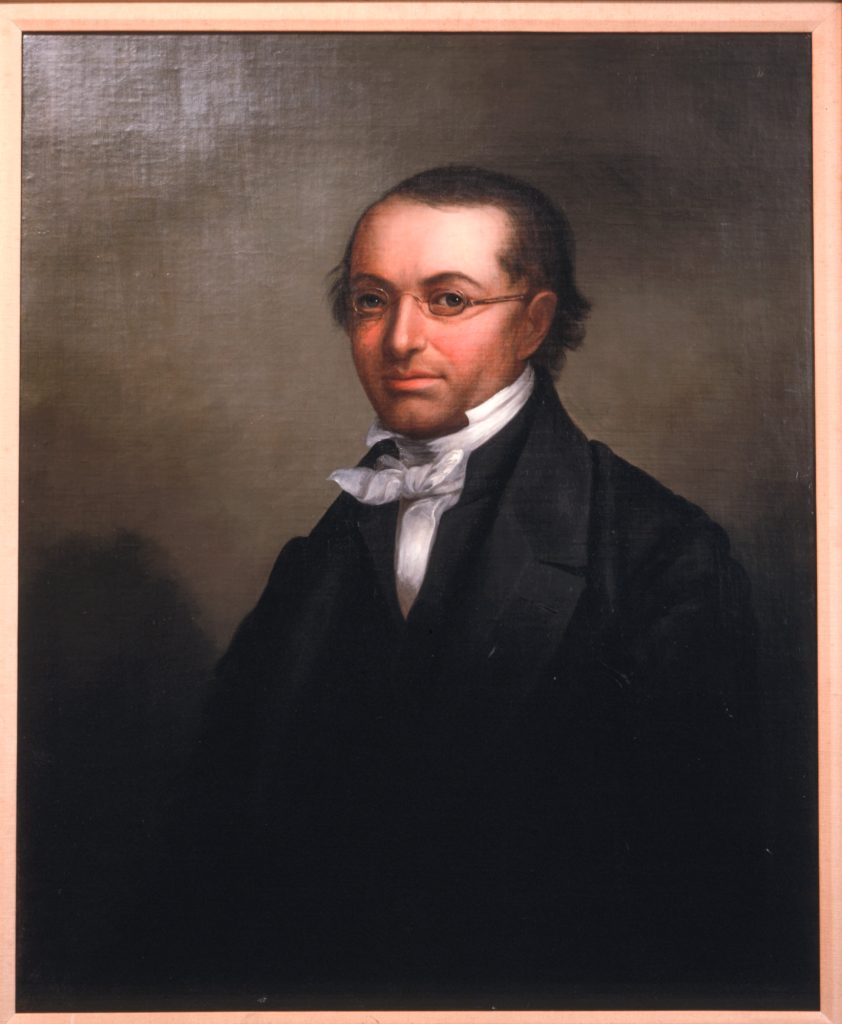Over the course of four decades, Isaac Leeser filled a variety ofsignificant roles in American Jewish life —scholar, hazan,writer, editor, publisher, organizer, compiler and translator. Hewas, in fact, the most important American Jewish figure of his day.
Leeser’supbringing in Westphalia was peripatetic, and his educationinconsistent, owing in part to several family relocations and in partto the early deaths of both his parents—his mother when he was 8,and his father and paternal grandmother six years later. Thusorphaned, the 14-year-old Leeser made his way to Műnster, with thehelp of a benefactor, to continue his education at the MűnsterInstitute. This secular academy maintained a rigorous course ofstudy, and Leeser’s studies there included Greek, Latin, history,geography, mathematics and physics, which Leeser added to his earlierstudies in Hebrew and Jewish texts from the Jewish schools atDulmen. By age 17, he had completed his education and accepted aninvitation from his maternal uncle, Zalme Rehine, to come to theUnited States. He traveled alone and joined his uncle at Richmond,Virginia, in early May of 1824.
Embraced by the Jewish community in Richmond, Leeser quickly imbibedAmerican ideals and became a proponent of Jeffersonian republicanism.He was soon encouraged by his uncle and new American friends, whonoted his skill as a teacher and scholar, to pursue a career in thesynagogue. Among his mentors at Richmond were a numbered of learnedmen who played an influential role in shaping Leeser’s careerambitions: Baruch Hillel Judah, who served as Librarian for theRichmond Library Company, Isaac B. Seixas, who taught Leeser theSephardic mode of worship and engaged him as a Sabbath and day schoolteacher, Jacob Mordecai, parnas of Congregation Beth Shalomeand author of a number of scholarly manuscripts, and IsraelBaer Kursheedt, the leading expert on Jewish law in America.The publication of several of Leeser’s letters defending Judaism ina Richmond newspaper soon brought him public renown among AmericanJewry, and as a result, in 1829, Leeser wrote his first bookmanuscript, entitled The Jews and the Mosaic Law, and wasoffered the post of hazan at Congregation Mikveh Israel inPhiladelphia, where he replaced the late Abraham I. Keys.
Theearly years of Leeser’s tenure in Philadelphia saw the developmentof two key innovations that were among his greatest contributions toAmerican Judaism. First, inspired by the Reform movement among Jewsin Germany, Leeser standardized the practice of giving sermons inEnglish language at Mikveh Israel. Then, after several difficultattempts to find publishers for his manuscripts, Leeser opened hisown publishing firm, the American Jewish Publication Society, in1845. This was the first press in the United States with an explicitfocus on Jewish texts and as well as the first national Jewishinstitution devoted to advancing Jewish culture.
Leeseralso continued his own scholarly work, authoring prayerbooks,religious readers, and political tracts as well as essays andsermons. From 1830 until his death, less than forty years later,Leeser published dozens of volumes in Jewish theology, history andliturgy, and introduced the work of important Jewish authors such asMoses Mendelsohn and Grace Aguilar to an American audience throughhis editing and translation of their work. Leeser’s Catechismfor Younger Children (1839) served as the key educational text inthe Hebrew Sunday School founded by RebeccaGratz, and laid the cornerstone of American Jewish pedagogyfor several generations.
In 1843 Leeser founded the Occident and American JewishAdvocate, the first sustained publication of Jewish interest inthe United States, with the stated purpose “togive circulation to every thing which can be interesting to theJewish inhabitants in the western hemisphere.” Leeser wouldcontinue as principle editor and publisher of the Occident untilhis death, using the paper to highlight Jewish causes, publishimportant sermons and advocate for national Jewish institutions and abetter system of allocating resources to Jewish charities. Among themany charitable institutions he helped to found in Philadelphia werethe Hebrew Education Society (1847), the Jewish Foster Home (1850),the Jewish Hospital (1866), and Maimonides College (1867). The latterwas the first Jewish theological seminary in the United States, andLeeser served as its founding president. He was also a founding VicePresident of the Board of Delegates of American Israelites in 1859,and held that post until his death.
Leeser, who never married, was never popular with the congregationat Mikveh Israel, and he retired from this post in 1850 amid a hailof controversy, to be replace by Sabato Morais. Determined to supporthimself as a freelance writer, Leeser then announced severalpublication projects in addition to The Occident and turneddown offers from congregations in Charleston and Sydney, Australia.He made a four month tour of the Western states, visiting 25 Jewishcommunities, raising readership for The Occident andidentifying subscribers for his project to translate the Hebrew bibleinto English, which was completed in 1854 to critical acclaim.Several years later, he took up the post of hazan at a newlyformed Sephardic congregation, Beth El Emeth in Philadelphia, wherehe officiated until his death in 1868 at age 62.
